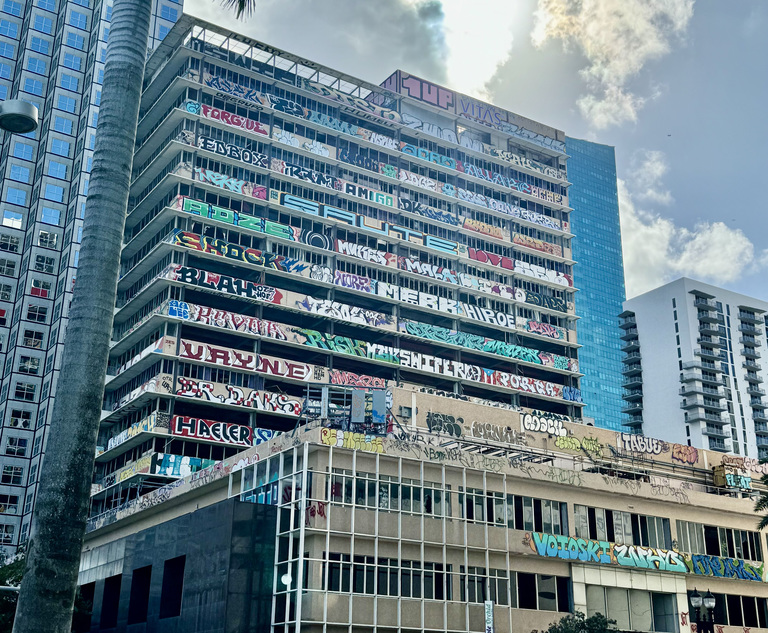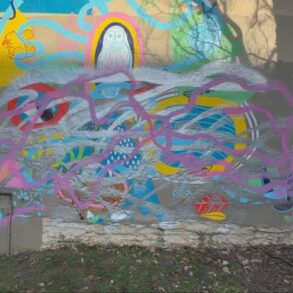
A Miami property owner faces mounting legal challenges as the city is demanding graffiti removal from an active demolition site under a valid permit. Despite the building’s imminent demolition, the city filed a lawsuit to compel the removal of the spray-painted exterior, citing the building as an eye-sore ahead of New Year’s festivities.
“The property is an active demolition site under a valid permit issued by the city,” said attorney José M. Ferrer of Mark Migdal & Hayden who represents the building’s owners. “Despite this, the city wants the graffiti removed before New Year’s festivities and filed a lawsuit to force my client to paint the building—a project estimated to cost over $150,000. We opposed this.”
On Friday, in the defendant’s response in opposition to the city’s emergency motion for injunctive relief, Northwestern Capital Corporation said the city’s motion is a clear overreach, motivated not by any genuine emergency but by purely aesthetic concerns.
“The city seeks to address what it terms an ‘eyesore’ visible to those who transit downtown Miami. However, the purported emergency—the upcoming New Year’s Eve festivities—is no emergency at all. By the city’s own admission, the graffiti at issue has existed for over a year, and its delay in enforcement undermines any claim of urgency or irreparable harm,” they contended in court documents.
19-Story Art Canvas
During the most recent Art Basel event in Miami, several graffiti artists got together to tag the soon-to-be-demolished building. Many of the names emblazoned on the 1989 skyscraper are recognizable artists from across the world who used the facade as a canvas. Some even took to Instagram to oppose the demolition of the unsanctioned “artwork.” Others said the building “can’t be demolished soon enough.” The structure is located in the Bayfront section of downtown Miami.
Ferrer said the owner thinks the cost the city is asking his client to incur is “excessive” given the building will be torn down soon, and they also cited the work poses significant safety risks, with painters scaling a building without elevators or electricity in an active demolition zone.
On Friday, before the court could even take up the issue, Ferrer said the city sent painters to the property without authorization.
“We had them removed and secured the site and filed a separate lawsuit seeking injunctive relief. However, the painters returned [Saturday] and were again escorted off the property,” Ferrer said.
The City Attorney, George Wysong, who did not return an email for comment by press time, noted in court documents that the Code Enforcement Board found the owner of the structure failed “to maintain [the] exterior” and would be fined $500 per day.
“The owner is in violation of city code, and that the owner has made no effort to comply with the graffiti violation which continues to be an eyesore and a detriment to all of downtown Miami,” the complaint against the building owner read.
In February, the city attorney noted in court documents that Northwestern pleaded guilty to violations for “failure to register a vacant structure, failure to maintain the exterior, having a vacant, blighted or abandoned structure, graffiti on property, failure to maintain a clean lot and illegal work performed without a required permit.”
However, the building owner has denounced the city’s actions, calling it reckless and unjustified.
“The city’s reckless decision to send workers onto an active demolition site not only creates significant safety risks but also burdens my client with unjustifiable costs,” Ferrer said. “These unnecessary and unilateral actions persist even though the demolition is already well underway, and the graffiti will be removed in due course as part of this lawful process—potentially as early as March, if the city chooses to cooperate.
Ferrer said his client is fully committed to addressing the city’s concerns responsibly and has always been open to working collaboratively toward a lawful resolution.
“But the city’s actions undermine safety, property rights and common sense,” Ferrer said.
Northwest Capital said in the response that the city’s motion undermines its own claim of an emergency. By admitting that the graffiti has existed for over a year, they said the city concedes that this is not a situation requiring immediate judicial intervention.
“The complaint further acknowledges that defendant is actively demolishing the property and expects the process to be completed within six to nine months. This demonstrates that the alleged violations, including the graffiti, are already being addressed comprehensively through lawful demolition efforts. Emergency relief is unnecessary when the property owner is already taking substantial steps to resolve the issue,” Northwest said.
In citing S. Florida Limousines, Inc. v. Broward Cnty. Aviation Dept., court documents said, “the city’s sudden urgency, tied to upcoming holiday festivities, does not transform a long-standing issue into an emergency. Courts consistently deny emergency relief where the movant’s delay in enforcement undermines any claim of irreparable harm.”
S. Florida Limousines appealed an order denying a motion for temporary injunctive relief. The Florida appeals court affirmed the lower court’s denial of a temporary injunction, finding the appellant failed to show an abuse of the trial court’s discretion.
This post was originally published on this site be sure to check out more of their content.






